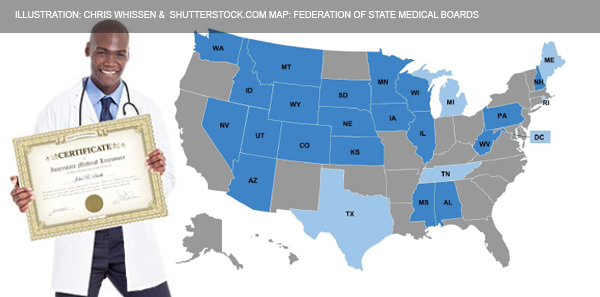
It just got easier for emergency physicians to obtain medical licenses in multiple states.
For decades, most state medical boards have tried to improve and simplify their medical licensing process, including developing a universal license application and improving the sharing of information among medical boards. However, the Holy Grail of medical regulation, a portable interstate license, remained elusive. The barriers to this interstate license were numerous. Mostly, medical boards were concerned about losing their autonomy over regulating medicine and supervising the care provided by physicians in their own state. As anyone who has applied to multiple states for licensure can attest, each state has slightly different requirements and processes toward granting licensure. A federal medical license covering all the states was not considered an option, as the Federation of State Medical Boards (FSMB) upholds the principle of the 10th Amendment as a core principle that any power not specifically granted to the federal government by the Constitution belongs to the states.
Explore This Issue
ACEP Now: Vol 36 – No 06 – June 2017In 2014, FSMB members finally agreed on model legislation to create an interstate compact for medical licensure. Interstate compacts regarding licenses are very common; these compacts impart reciprocity from one state to another from a license held by the home state’s citizen. The best example with which we are all familiar is a driver’s license. If you hold a license to drive in Iowa, you can legally use that license in any other state. Why not do the same for practicing medicine? Thus far, 20 states have signed on to the interstate medical compact and have been developing their processes for providing expedited licenses to physicians from other compact states (see Figure 1).
As of April 3, 2017, seven states (Alabama, Idaho, Iowa, Kansas, West Virginia, Wisconsin, and Wyoming) are ready to issue compact licenses. In fact, the first interstate medical license was issued on April 20, 2017, to a physician from Wisconsin who was seeking a license in Colorado. The 13 other compact states are coming on board soon. Hopefully, more states will pass the compact legislation and join the growing list.
A compact state will grant an expedited license to a physician from another state. This means that the physician can get an additional license by completing a short form and paying $700 plus the license fees for that new state. The verification of training, background, and board certification will come from the home state without additional work by the applicant.
Pages: 1 2 | Single Page





No Responses to “The Interstate Medical Licensure Compact Is Live”